LBee Health and Lauren Howard Exposed: Fraudulent ADHD and Autism Assessments
Victim Testimonies, Investigation, and How Elle Two Exploited Neurodivergent Communities
When ADHD and Autism Assessments Become Exploitation: Why This Investigation Exists
This is an evidence-based investigation documenting how LBee Health marketed itself as a safe, neuro-affirmative space while selling unregulated assessments to some of the most vulnerable members of the autistic and ADHD communities.
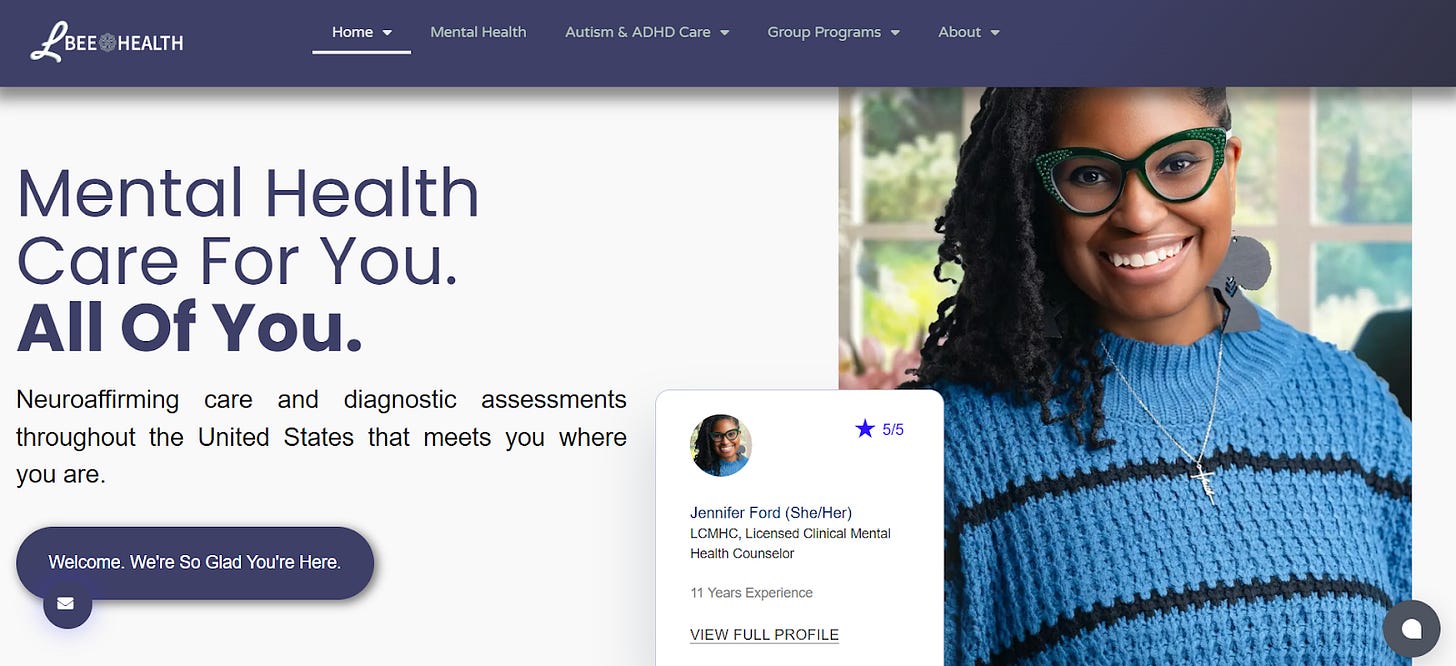
This is not a feud. It is not gossip. It is not a vague callout.
This is an evidence-based investigation documenting how LBee Health marketed itself as a safe, neuro-affirmative space while selling unregulated assessments to some of the most vulnerable members of the autistic and ADHD communities.
Many people paid nearly $500 for assessments that offered no meaningful support in securing workplace accommodations, education plans, or disability benefits. While some employers or schools may accept even minimal documentation, LBee Health did not provide the kind of detailed, clinician-supported reports typically required—nor did they guide clients through the process. Instead, they shifted all responsibility back onto the client.
As one victim explained:
“I had also explained to them multiple times that I was seeking a re-diagnosis in order to get back on disability and not once did anyone explain to me that it could NOT be used for that so they essentially stole money from me that could have been used for a proper diagnosis from a real professional.”
In contrast, reputable assessment providers—like Vayda Mental Health in Minnesota—help clients prepare documentation that meets the requirements for state disability claims, a crucial step LBee Health simply did not offer.
I am writing this publicly because these tactics do real harm—financial, emotional, and communal. They fracture trust in neurodivergent spaces and exploit the desperation that comes from being repeatedly dismissed by mainstream medical systems.
This investigation is survivor-centered. It is built on testimony, documentation, and a commitment to protecting our communities from further harm.
I am not new to this work. My background includes internationally recognized justice and advocacy efforts acknowledged by governments, humanitarian organizations, and survivor networks. That experience matters here, because exposing predatory practices takes more than moral outrage. It takes rigor. It takes evidence. It takes naming what people would prefer remain hidden.
This work is also not done alone. It draws on conversations with clinicians, legal researchers, neurodivergent advocates, and survivors themselves. Wherever this investigation relies on shared insight or testimony, that will be clear. At the same time, I want to be transparent: any final analysis and conclusions here are mine.

For those worried about legal or financial intimidation—know there is support. Survivors are not alone. I stand behind this work fully and will connect those who need it with the team working on this investigation to help ensure their experiences are defended and amplified.
Finally, let’s be clear about responsibility. This investigation is my writing, my accountability, my line in the sand. But I am not responsible for how third parties might use survivor data they have collected separately. Any forms, surveys, or shared experiences beyond this essay are theirs to manage ethically.
My commitment here is simple: to document, in detail and with care, a business model that capitalized on neurodivergent vulnerability. So that those who search for LBee Health, or any similar service, will find not just marketing—but the truth.
This is for those who were shamed into silence. For those who felt they had nowhere else to go. For those who need to know they were not at fault.
Because protecting our community means more than “raising awareness.” It means refusing to let this happen in the dark, unchallenged, ever again.
The Face of Care: Lauren Howard and the LBee Health Brand
LBee Health does not present itself as a scam. It presents as safety.

If you search their website or social media, you’ll find language promising a neuroaffirming, trauma-informed, inclusive mental health practice. They brand themselves as the opposite of gatekeeping clinics and insurance bureaucracy—a place that will see you, believe you, and diagnose you without judgment.
Their marketing is polished and strategic. Phrases like “Meet us where you are” and “Accessible neuroaffirming care” repeat across their site. They stress how quickly you can get in: “Assessment booking in as little as 7 days.” They promise insurance coverage, low copays, group sessions, and “no judgment” intake calls.
Founder Lauren “L2” Howard’s personal branding reinforces that tone. She positions herself as blunt, raw, anti-corporate. On LinkedIn and Threads she swears openly, criticizes the failings of traditional mental health systems, and tells followers she created LBee Health to be the answer to her own burnout and trauma.

This is not accidental. It is marketing designed to feel personal and disarming.
LBee Health explicitly claims to be different from the inaccessible, dismissive clinics so many autistic and ADHD people have faced. Howard’s podcast episode—Innovating with Intention: How Lauren L2 Howard is Changing Mental Health Care—frames her mission as an ethical disruption: one that listens, accommodates, and treats clients as humans rather than cases.
Their price point is also a selling point. The $485 flat fee for adult ADHD or autism assessment is marketed as accessible, with financing options like scholarships available. It sounds like a bargain in a country where formal diagnostic processes can run into the thousands. Howard has written on LinkedIn:
“We don’t have a marketing budget. We fund staff wellbeing. We have $0 copays, remote teams, an adult autism diagnostic program for $485. We just wanted to make this one thing easier.”
That transparency about money is designed to feel ethical. It suggests LBee Health is not profiteering but serving the community—an anti-capitalist health collective in spirit if not in legal structure.
LBee Health’s social channels also trade heavily on diversity and inclusion. They use DEI language, post about health equity and social justice, and highlight their staff’s racial and professional diversity. Group therapy offerings are framed as culturally sensitive and neuroaffirming. The message is clear: we understand you because we are you.

Howard’s personal approach deepens that sense of intimacy. She posts about being easy to reach on Threads. She uses trauma-informed language to recruit: talking openly about neurodivergent burnout, mental health stigma, and why traditional providers are harmful. She speaks to the sense of crisis many clients feel after years of dismissal or self-doubt.
All of this positions LBee Health as:
Safe.
ADHD/autism-friendly.
Inclusive.
Neuro-affirmative.
Trauma-aware.
Accessible.
Easy to talk to.
It’s no surprise the business scaled rapidly. As waitlists for formal diagnosis grew, and insurance barriers blocked access, LBee Health offered something that looked radically better: fast, cheap, understanding.
This section isn’t about dismissing those marketing promises out of hand. The reality is that neurodivergent people do need faster, cheaper, more respectful diagnostic care. That need is real. The problem arises when that need is met with empty promises and unregulated, unvalidated assessments sold as the answer.
Our investigation will compare this caring public image with what actually happened to the people who trusted it.
Tactics of Manipulation: How LBee Health Exploited Neurodivergent Vulnerability
LBee Health did not just sell assessments. It sold belonging.
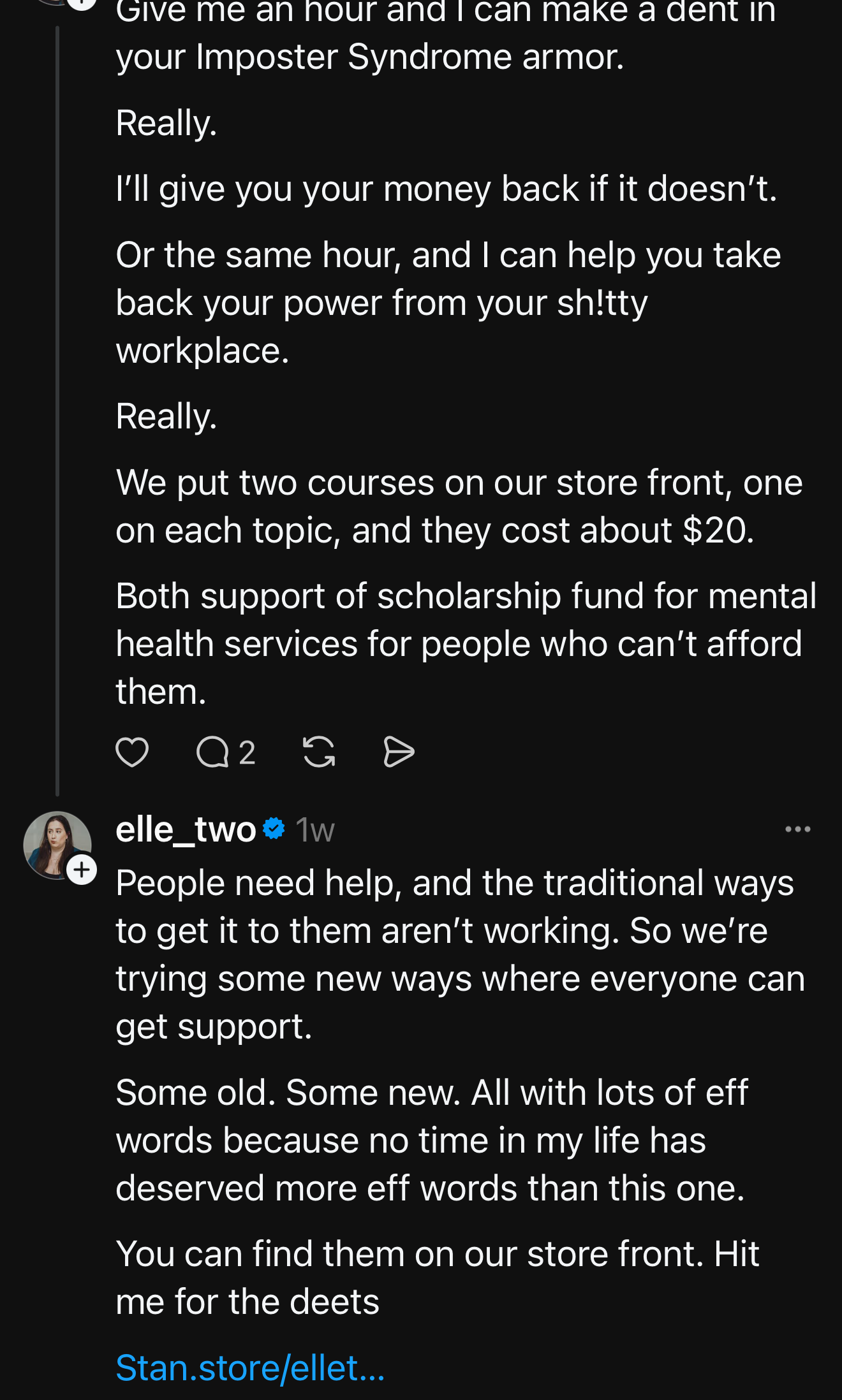
Their entire approach was built on trust-building tactics designed to feel personal, intimate, and safe—particularly for a neurodivergent audience used to being gaslit, dismissed, or pathologized in clinical settings.
Love bombing and community-building were central. From day one, clients describe being showered with affirming language: You’re brave for seeking help. You deserve to be understood. We’re different from those other places that don’t listen.
This wasn't just marketing copy on a website. It extended to direct messages, intake calls, and social posts from founder Lauren “L2” Howard herself, who encouraged a sense of personal access. She was “easy to reach,” chatting on Threads, responding in real-time. This was not a distant clinic. It was a friend.
Co-opting Black and brown voices was another deliberate strategy.
LBee Health recruited BIPOC clinicians and community advocates who lent credibility to claims of cultural sensitivity. Marketing materials featured diverse faces. Clients reported that Howard specifically pointed to Black and brown team members in discussions of “safe space” and “understanding intersectionality.”
Shaming and belittling skeptics was part of the sales process. Clients who asked direct questions about costs, the qualifications behind the $485 “diagnosis,” or the clinical rigor of the assessment process were often met with condescension, avoidance, or outright scolding. Screenshots show replies accusing questioners of being “unready to heal” or “hostile,” turning legitimate consumer questions into evidence of patient dysfunction.
Blocking, silencing, and dogpiling critics was systematic. When former clients raised concerns publicly—about useless assessments, refusals of refunds, or the inability to use LBee’s reports for school or work accommodations—they were quickly blocked on social media. Threads show Howard’s followers being encouraged to defend her, dismiss critics, and maintain the image of a “safe, trusted” community.
This parasocial relationship model was not accidental.
It leveraged the loneliness many late-diagnosed autistic and ADHD adults feel, particularly those from marginalized backgrounds. LBee Health’s approach fostered not just customer loyalty but emotional dependence. Clients felt seen, validated, and included in a community that claimed to reject the cold, ableist medical system.
The emotional manipulation ran deep. Testimonials describe being made to feel unworthy of understanding or healing if they wouldn’t pay. The subtext: If you don’t buy this diagnosis, you’re refusing to take your mental health seriously. This is a predatory tactic familiar in the wellness industry—selling not just a service, but the implication that your worthiness depends on it.
All of this centered around a $485 “ADHD/autism assessment” that LBee Health marketed as an accessible, liberating alternative to clinical gatekeeping. But there was no regulated oversight. No standardized, validated tools guaranteed to meet the requirements for school accommodations, disability benefits, or workplace protections. Many clients found themselves with expensive paperwork that no provider or government agency would recognize.
They were sold hope, belonging, and the promise of answers. What they got was an invoice.
Our investigation includes quotes, screenshots, and testimony documenting these tactics in detail. This is a documented, repeatable pattern.
LBee Health’s success depended on making people feel too grateful, too loyal, or too ashamed to question what they were buying.
We’re questioning it now.
LBee Health ADHD and Autism Assessment Harm – Financial, Emotional, Community Impact
For many who turned to LBee Health, the $485 assessment wasn’t an affordable gateway to care. It was an expensive lesson in false promises.
Financial Exploitation
LBee Health marketed their $485 flat-fee diagnostic as accessible—and $780 for combined ADHD and autism assessments—but for clients already navigating limited resources, these costs became a serious financial burden.
Those who paid often received paperwork they couldn’t use for accommodations, disability claims, or any meaningful medical validation—leaving them out hundreds of dollars with no practical support or recourse.

Trustpilot users describe LBee as “money grubbers” and warn others:
“Liars, money grubbers.” (threads.com, trustpilot.com)
“Fake testing? … Didn’t try to make me feel comfortable … I don’t feel I got a qualified test.” (trustpilot.com)
Dismissive or Hostile Communication
Clients who asked for answers were often rebuffed, blamed, or ridiculed for their concerns.
A Trustpilot reviewer described being “removed from care with no conversation… gaslit… told that the very way I communicate… was the reason I didn’t ‘fit.’” (trustpilot.com)
Another described a “rushed experience” with practitioners who “don’t care about you—they just… want that shit over with.” (trustpilot.com)
Refusals of Service and Refunds
Clients who discovered their reports were unusable or asked for refunds were met with refusal or delay. When refunds were issued, they appeared selective—preserving LBee’s reputation while avoiding broader accountability.
Unusable or Poorly Designed Reports
LBee Health’s reports didn’t just fall short of expectations—they often failed the most basic standards of clinical assessment.
Based on collected testimony and screenshots, many clients received reports that were built on only two tools:
The Autism Spectrum Quotient (AQ or AQS), which is a self-report screener freely available online (for example, on Embrace Autism).
A proprietary LBee Health measure, described in their reports as combining DSM-5 criteria with social history and “feminine/non-binary presentations” to address “experiences that are not well evaluated in existing, validated measures.”
These sound reassuring on paper—but this approach raises serious red flags.
The AQ is not a diagnostic tool. It’s a screening questionnaire. It’s not designed to diagnose autism on its own. Reputable clinicians use it as one data point among many in a full assessment.
Meanwhile, LBee Health’s self-created measure appears to have no external validation or published evidence base. Their own reports admit they adapted criteria specifically because existing tools didn’t evaluate certain experiences well. While inclusivity is important, simply writing your own diagnostic measure isn’t enough—especially without publishing or validating it against clinical standards.
What a Real ADHD and Autisn Assessment Should Look Like
A thorough diagnostic process for ADHD or autism is multi-layered. It often includes:
Clinical interviews guided by DSM-5 criteria.
Standardized diagnostic tools accepted in professional practice.
Cross-informant reports (where feasible).
Developmental history.
Differential diagnosis to rule out other explanations.
For reference:
In credible practices, your psychologist might also screen for other conditions to rule them out (known as differential diagnosis). For example, during my own assessment, additional tools were used to check for OCD and BPD. This matters because ADHD and autism symptoms can overlap with or mask other mental health conditions.
“An appropriate evaluation must consider whether the symptoms belong to ADHD, another mental health condition, another physical health condition, or if they represent more than one disorder.” (AAFP ADHD Toolkit)
LBee Health’s reports often lacked this critical layer entirely. Victims describe receiving templated documents that didn’t clearly state that other conditions were ruled out—or even considered.
Quotes from LBee Health Reports
“The measures combine DSM V criteria as well as medical history, social history and feminine/non-binary presentations to address experiences that are not well evaluated in existing, validated measures.”
This language admits they’re substituting unvalidated internal tools in place of recognized diagnostics. It sounds inclusive—but it is not clinically rigorous.
Anonymous Victim Testimony
“It was concerning to see that the assessor’s publicly available credentials didn’t mention autism expertise or training. It appeared that information was simply added to the website profile without evidence of relevant qualifications.”
Assessment Time Comparison
LBee Health claims their average assessment time is 94 minutes, but some clients report sessions as short as 39 minutes. By contrast, reputable practices often conduct multiple hours of interviews over several sessions to ensure accuracy, depth, and space for thorough differential diagnosis.
In summary:
LBee Health used only AQ and their own unvalidated tool as the core of many reports.
They failed to use standard, validated, multi-step diagnostic protocols.
Reports often omitted critical differential diagnosis entirely.
Clients were left with documents that offered no meaningful support for accommodations or disability claims.
For people paying nearly $500—often out of pocket—this isn’t just sloppy. It’s exploitation dressed up as inclusivity.
Non-Scientific Assessment Tools
Clients described a striking lack of standardization in LBee Health’s process. For some, the assessment felt like a scripted Q&A with no meaningful clinical evaluation—flat, disengaged, and offering none of the depth you’d expect from a professional diagnostic interview. (reddit.com, trustpilot.com)
Emotional Harm and False Promises
LBee Health wasn’t just selling assessments. They were selling the promise of being seen, understood, and validated in spaces where many neurodivergent people have felt ignored or harmed. But for many, that promise dissolved into feelings of confusion, shame, and betrayal for having trusted what was marketed as a “trauma-informed” service.
A Diagnosis Factory Model
LBee Health emphasized speed and accessibility, advertising bookings “in as little as 7 days.” While that looked efficient on the surface, clients reported rushed, inconsistent care with little meaningful follow-up. The high-volume model prioritized sales over quality or individualized attention.
Community Impact, Induced Shame
When victims spoke up, they described being blamed for doubting the process or for “not being ready.” One review noted:
“Emotionally harmful and gaslighting experience… I expressed myself clearly… instead of compassion, I was removed from care… They punished me for traits that align with autism.” (lbeehealth.com, trustpilot.com)
A Consistent Pattern of Harm
This isn’t an isolated set of bad experiences—it’s a repeatable, documented pattern of harm impacting people with limited options and high hope. Scroll through Trustpilot, Reddit, and our collected screenshots and you’ll see the same grim story repeated again and again.
LBee Health sold those $485 assessments as access and relief. But for too many, what they delivered was disappointment, confusion, and added cost. That deserves accountability.
Why We Don’t Victim-Blame and Why We should Care About Community
I want to be clear about something: if you were harmed, misled, or scammed by LBee Health, you didn’t “fail” by not seeing it coming.
I’ve seen people in our community blaming themselves: “I should have known better. I should have done more due diligence.” I’ve also seen outsiders use that to victim-blame—acting as if autistic and ADHD people should somehow be immune to exploitation, as if we’re all supposed to be hyper-rational savants with encyclopedic knowledge of every red flag.
This line of thinking is deeply flawed, and it’s also ableist.
Autistic and ADHD people are especially vulnerable to exploitation. The stats don’t lie. Autistic women, girls, and disabled persons face much higher rates of sexual assault, financial abuse, and manipulation than the general population. Our social learning differences, trauma histories, and experiences of systemic discrimination make us prime targets for scammers who know exactly how to build trust and then betray it.
And let’s talk about “Aspie supremacy,” that elitist idea that all autistic people should be walking Rain Men who can outthink any scammer. That mindset is dangerous. It ignores our diversity. It forgets that allistic people specialize and have gaps too. No one knows everything. No one should have to.
Abusers and scammers are experts at what they do.
They study us. They adapt. They use trauma-informed language, social justice rhetoric, and community ties to appear safe. LBee Health’s founder has publicly acknowledged in an interview that she knowingly collaborated with someone preparing to commit fraud.This isn’t accidental. It’s strategic.
If you trusted them, that doesn’t mean you were foolish. It means you were a human being looking for help. That is not a moral failing.
We also need to stop shaming ourselves or each other for having supported them in the past. Scammers depend on that shame to keep us quiet. They know that if we’re busy beating ourselves up, we’re less likely to speak out, warn others, or organize for change.
Here’s the truth: there’s no shame in not knowing better before. The power is in what we do once we know.
This investigation isn’t about assigning blame to victims. It’s about collective care. It’s about making sure everyone, at any stage of diagnosis, from any background has access to the knowledge needed to stay safer.
If you fell for it before, you’re not weak. You’re part of a community that deserves better. And building that better starts with refusing to carry shame that doesn’t belong to us.
Why ADHD and Autism Assessment Scams Thrive
LBee Health’s practices aren’t an anomaly. They are a symptom of systemic failure in how we treat neurodivergent people—a failure that has been growing in plain sight.
The story here isn’t just about one business. It’s about an entire ecosystem that makes exploitation possible by refusing to offer accessible, regulated, respectful care in the first place.
An Unregulated Wellness Industry
In recent years, the private wellness and coaching sector has boomed, selling everything from trauma healing to mental health assessments. But regulation hasn’t kept up. Clinics offering psychological “support” and diagnostic reports often dodge licensing requirements entirely, exploiting loopholes and grey zones.
There is no consistent oversight to ensure quality, safety, or accountability. This gap is exactly where businesses like LBee Health thrive. They fill the void left by underfunded public systems and with it, they fill their pockets.
Exploitation of Autistic and ADHD Communities
Autistic and ADHD adults, especially those who went undiagnosed for decades, form a particularly vulnerable market. Many have spent years being dismissed or pathologized. The pandemic only deepened the crisis, pushing demand for diagnosis to unprecedented levels.
In places like the UK, autism referrals have increased fivefold, with average waitlists stretching nine months or longer. This surging demand creates ideal conditions for providers who promise empathy, speed, and validation—while sidestepping clinical rigor and accountability. LBee Health capitalized on that urgent need for understanding, offering rapid assessments that too often delivered little more than unusable paperwork.
In Ireland, the situation is equally stark. Officially, you cannot obtain an autism diagnosis solely through public health services—it is often folded into the process of diagnosing other conditions, leaving many without clear, standalone assessments. This forces families and adults into private systems if they want dedicated autism evaluation, creating yet another market vulnerable to under-regulated, for-profit solutions.
Formal Diagnosis Is Inaccessible and Unaffordable
It’s no mystery why so many turn to these private options. Formal diagnostic pathways are expensive and scarce. In the U.S., assessments routinely cost thousands of dollars. In the UK and Canada, patients wait months or even years to see qualified professionals.
This impossible barrier creates a parallel market: cheaper, faster alternatives that often lack any meaningful oversight. People pay out of pocket for what feels like relief, only to discover there is no safety net if something goes wrong.
Lack of Understanding of Neurodivergent Presentations
Clinicians themselves often fail to recognize autism and ADHD when it doesn’t match the stereotypical, white, male, childhood presentation. Women, people of color, late-diagnosed adults—all routinely fall through the cracks because they’ve been forced to “mask” their traits.
When someone finally finds a provider who uses neuroaffirming language and speaks their experience fluently, it can feel like salvation. That trust is powerful—and ripe for abuse. Tone can replace rigor. Validation can obscure the fact that the assessment itself is unregulated or inadequate.
Structural Ableism
None of this happens in a vacuum. The entire healthcare system is shaped by ableist assumptions about whose minds and bodies matter. Neurotypical norms are enforced through policies that gatekeep education, employment, and healthcare itself.
When public systems fail to recognize or support neurodivergent people, for-profit alternatives step in. But these alternatives often replicate the same inequities in monetized form—selling “access” to those who can pay while leaving the most marginalized behind.
Why Lbee Health / Elle Two Isn’t an Isolated Case
LBee Health is far from the only provider operating this way. It’s simply one of the more visible examples of a much broader pattern playing out across the U.S., Canada, the UK, and Europe.
Surging demand for ADHD and autism assessments has been described by the NHS in the UK as an “avalanche” of new cases. In England, ADHD referrals quadrupled during the pandemic while specialist capacity remained flat. Similar waitlists and bottlenecks have been reported across Europe even in Sweden where I am writing this article from as well as our neighboring countries where I work and operate from and in parts of Canada, leaving many people desperate for answers.
In the U.S., formal diagnostic assessments can be prohibitively expensive, often running into the thousands of dollars without insurance coverage. This barrier pushes people to seek cheaper, faster private alternatives that promise accessibility without always delivering quality or accountability.
Regulation in the wellness and mental health assessment space remains patchy or nonexistent in many places. Private clinics and coaches step in to fill the gap, often with little meaningful oversight. These conditions make exploitation not only possible but entirely predictable.
What This Really Reveals About Exploiting Vulnerable Clients and Communities
LBee Health is just one case study in how systemic neglect, structural ableism, and unregulated industry practices converge to harm the very people they claim to serve.
When society fails to provide accessible, inclusive, regulated diagnostic care, market opportunists will always step in to sell a substitute. The result is predictable: vulnerable individuals paying out of pocket for validation without protection or accountability.
This investigation isn’t about destroying one provider’s reputation for the sake of spectacle. It’s about demanding real change: rigorous regulation of assessment providers, expanded public diagnostic capacity, and the dismantling of ableist systems that push people into these private traps in the first place.
Because until we fix those failures, there will always be another LBee Health.
What We’re Demanding from Lauren Howard and LBee Health Brand
This investigation isn’t a personal attack—it is a necessary act of protection for neurodivergent communities who have been exploited under the guise of care.
We demand real accountability from Lauren Howard and LBee Health. This community will not accept silence, evasion, or PR spin.
We call on them to:
Publicly acknowledge the harm inflicted on autistic and ADHD clients through misleading marketing, unregulated assessments, and dismissive, gaslighting responses to those who raised concerns.
Disclose in full the assessment methods, diagnostic tools, and clinician qualifications used to produce these reports—no more vague assurances or hidden practices.
Provide full refunds to clients who paid for assessments that failed to secure accommodations, disability support, or formal recognition—restorative action is non-negotiable.
Cease all marketing of these assessments as accessible, clinical solutions until they meet the same standards, validation, and oversight expected of legitimate diagnostic services.
Stop silencing survivors—including blocking, shaming, and orchestrating social media harassment against those who share their experiences. Instead, engage transparently and respectfully with community feedback and testimony.
Commit to external review and reform, partnering with qualified clinicians, regulatory bodies, and neurodivergent-led advocacy organizations to build real, validated, accessible pathways to assessment if they wish to continue offering these services.
Until these demands are met, this investigation will stand as public evidence of how the wellness industry can exploit vulnerable people while marketing itself as trauma-informed, inclusive, and neuro-affirming.
We will not stand by while that harm continues unchecked.
Investigation Resources and Wiki
We’ve compiled everything in one place to make this investigation transparent and actionable.
On the Wiki document you’ll find:
US and Canada Reporting Guides
A Community Impact & Support Survey
The full evidence base for this investigation
A Volunteer Application Form for those who want to help
It’s designed to make reporting easier, amplify survivor voices, and support anyone ready to take action.
How Do We Spot Wellness Scams and Protect Neurodivergent Communities?

It’s not enough to expose a harmful business model. We need to equip our communities with the knowledge and tools to avoid the same traps in the future.
LBee Health thrived because it promised something people desperately needed: understanding, recognition, and faster access to assessment. Those needs are real. The solution isn’t shaming people for seeking help—it’s giving them practical strategies to find real support without being exploited.
Below are concrete, survivor-centered steps to help navigate this landscape safely.
If You’re Seeking Assessment or Support
(How to vet providers, red flags, documentation, reporting options)
Check Credentials and Licensure
Look up the clinician’s license in your state or province’s public registry. Confirm they’re authorized to diagnose autism and ADHD—typically this means psychiatrists, psychologists, licensed clinical social workers, or advanced practice psychiatric nurses.Ask Direct Questions
What assessment tools do you use? Are they validated and accepted for accommodations or disability benefits? Will the report include formal diagnostic codes like DSM-5 or ICD-11, which are often required for schools, workplaces, or insurance? Can you confirm it meets the standards those institutions expect?Note: High-quality reports often include both DSM-5 and ICD-11 codes to ensure broad acceptance and clarity.
Watch for Red Flags
Be wary of vague promises, avoidance when asked about licensure, an emphasis on speed over quality, emotional manipulation (like shaming you for asking questions), or a lack of clear refund policies.
How Long Should Assessments Take?
Comprehensive ADHD and autism assessments for adults typically require multiple sessions totaling 3 to 6 hours of direct clinical time.
Mine in England and sweden both required multiple visits over a few months. Blood tests too. This includes an in-depth intake interview, standardized diagnostic tools, collateral interviews if appropriate, and careful differential diagnosis to rule out other conditions.
Responsible clinicians rarely complete this process in a single brief session. Instead, they spread it over several appointments to ensure accuracy, depth, and documentation robust enough to meet formal requirements for accommodations, disability benefits, or clinical referrals.
They also spoke to my family members and if you have none living they will speak to friends who have known you for a long time.
How to Report Suspected Fraud
File with Consumer Protection Agencies
In the U.S., start with your state Attorney General’s office or Department of Consumer Protection.
In Canada, contact the Competition Bureau or your provincial consumer services.
Contact Professional Licensing Boards
Report unlicensed practice or ethical violations to the relevant state or provincial licensing body.
Report to Federal Agencies
In the U.S., file complaints with the Federal Trade Commission (FTC).
In Canada, report deceptive marketing to the Competition Bureau.
Document and Record Everything
Save all emails, receipts, reports, and screenshots. Always record interactions where possible (within local legal limits). Keep a clear timeline of communications and transactions.
*From my perspective as an advocate, I can tell you that having solid documentation makes your complaint stronger and protects you if there’s ever a dispute about what was promised or delivered.
Affordable or Free Assessment Pathways
Public Health Systems
Ask your primary care provider for referrals to covered services.
In many countries, waitlists exist but are free or low-cost.
University Psychology Clinics
Many offer sliding-scale or free assessments as part of training programs.
Nonprofits and Advocacy Groups
Some offer reduced-cost assessments or can guide you toward reputable providers.
Employee Assistance Programs (EAPs)
If employed, check if your workplace offers free or subsidized psychological evaluations.
*Note: This list will vary by country and region, but here are general starting points.
Caring for Yourself When Sharing or Reporting Harm
If you choose to speak out about your experience, remember: your story is yours to tell, and only on your terms.

You don’t owe anyone every detail. Protect yourself by removing identifying information and being mindful of what you share publicly. Choose supportive, survivor-led spaces or trusted friends who will hold your truth with care.
Know that some people may try to dismiss or discredit what you say. That reflects on them, not you. Plan ahead for how you’ll respond—or decide not to engage at all. Sharing your testimony is an act of courage and community protection. You have the right to decide when, where, and how you share. You deserve to be heard without compromising your safety or dignity.
If you report harm and the system fails to act, that failure doesn’t mean you weren’t hurt. Your experience is real and valid, even if it’s not formally acknowledged. Seek out community care: lean on trusted friends, family, peer groups, or professional support if it’s available.
Most importantly, set boundaries around your advocacy. You don’t have to fight every battle. Choose what you have capacity for. Protecting your own wellbeing isn’t selfish—it’s necessary. You deserve the same care and protection you’re fighting to secure for others.
A Note to Readers
This section will keep evolving and will be updated with a link that will take you to all the evidence collated. If you have ideas, resources, or want to share what has helped you, please reach out or comment if you wish. This isn’t about gatekeeping knowledge—it’s about protecting one another from exploitation that preys on our need to be seen, understood, and validated.
Author’s Note
While I wrote this investigation and analysis, I want to thank Natalia (Rebelgirl Coach based in Ireland, with a Polish and European academic background) for her essential help compiling and verifying details. You can find her work at rebelgirlcoach.com.
My thanks also to the wider team of survivors, researchers, and advocates many of whom are also acquainted with Elle and who supported this effort to document harm and demand accountability.
More Essays on Neurodivergence, Exploitation, and Community Care
If this investigation resonates with you, share it. Talk about it. Help make sure others searching for ADHD and autism assessments see these documented harms before they spend their money. Protecting our community starts with refusing to stay silent.
Teaching the Children We Were
I didn’t wake up one day and decide to lecture in schools about racism. I became the person I needed when I was a child. That’s how this work began.
The Myth of Hyperlexia as Instant Genius: Why Fast Reading Isn't Fast Understanding
The Myth of Hyperlexia as Instant Genius: What Online Narratives Get Wrong
Neurodivergence in Ancient Africa: What History Forgot but Our Ancestors Knew
Neurodivergence Was Supported, Not Pathologized
The Myth of Hyperlexia as Instant Genius: Why Fast Reading Isn't Fast Understanding
The Myth of Hyperlexia as Instant Genius: What Online Narratives Get Wrong
To Book Me for Lectures, Keynotes, and Critical Conversations
I lecture internationally on subjects including—but not limited to—Sweden’s structural racism, systemic gaslighting of survivors, African matriarchal governance, neurodivergence before colonial pathology, and intersectional justice.
If you’re an organization, institution, or collective ready to move beyond checkbox diversity and confront the systems protecting inequality—you can book me for lectures, keynotes, panels, or workshops here: https://lovettejallow.com/ | Lovette@Lovettejallow.com
Who is Lovette Jallow?
Award-Winning Lecturer | Author | DEIBJ & Neurodiversity Expert
Lovette Jallow is one of Scandinavia’s most influential voices on systemic racism, intersectional justice, and human rights. A nine-time award-winning author, keynote speaker, lecturer, and humanitarian, she specializes in neurodiversity, workplace inclusion, and structural policy reform.
As one of the few Black, queer, autistic, ADHD, and Muslim women working at the intersection of human rights, systemic accountability, and corporate transformation, Lovette brings an unmatched perspective rooted in both lived experience and professional expertise. Her work bridges the gap between theory, research, and action, helping organizations move beyond performative diversity efforts toward sustainable, structural change.
She has worked across Sweden, The Gambia, Libya, and Lebanon, tackling institutional racism, legal discrimination, and refugee protection. Her expertise has been sought by global publications like The New York Times, on high-profile legal cases, and by international humanitarian organizations, where she has provided critical insights on racial justice, policy reform, and equity-driven leadership.
Follow Lovette Jallow – DEIB Strategist, Keynote Speaker & Humanitarian:
Website: lovettejallow.com
LinkedIn: linkedin.com/in/lovettejallow
Instagram: instagram.com/lovettejallow
YouTube: youtube.com/@jallowlovette
Twitter/X: twitter.com/lovettejallow













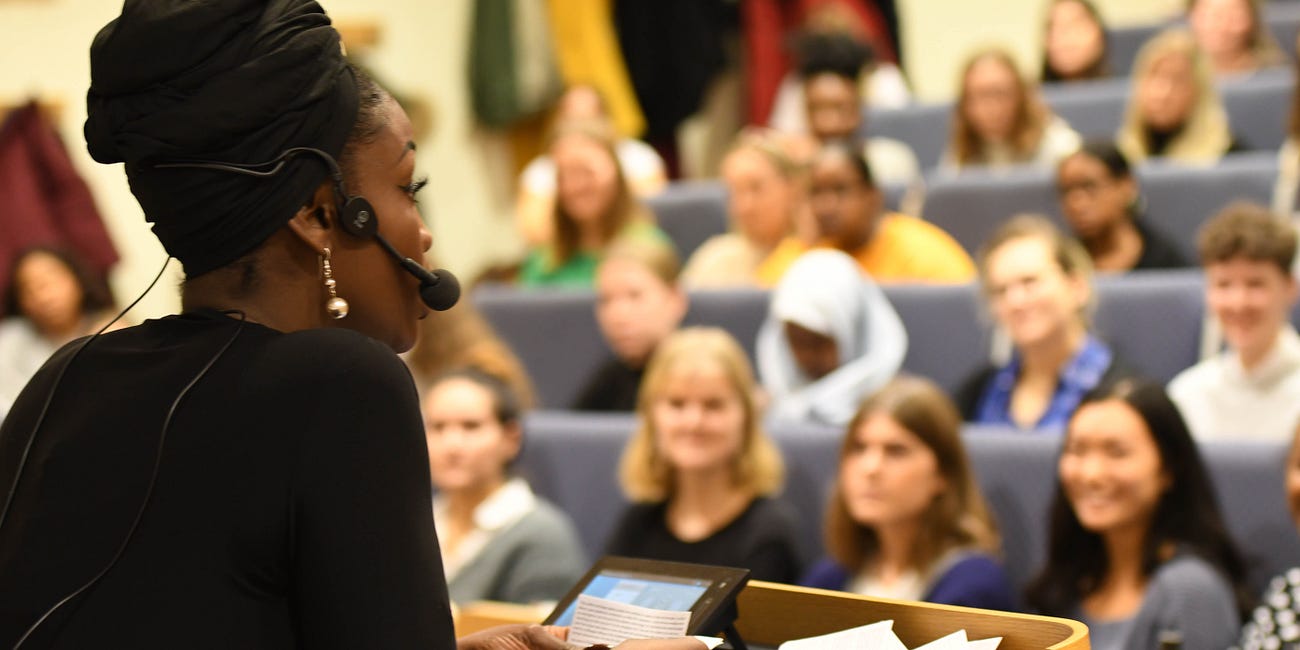


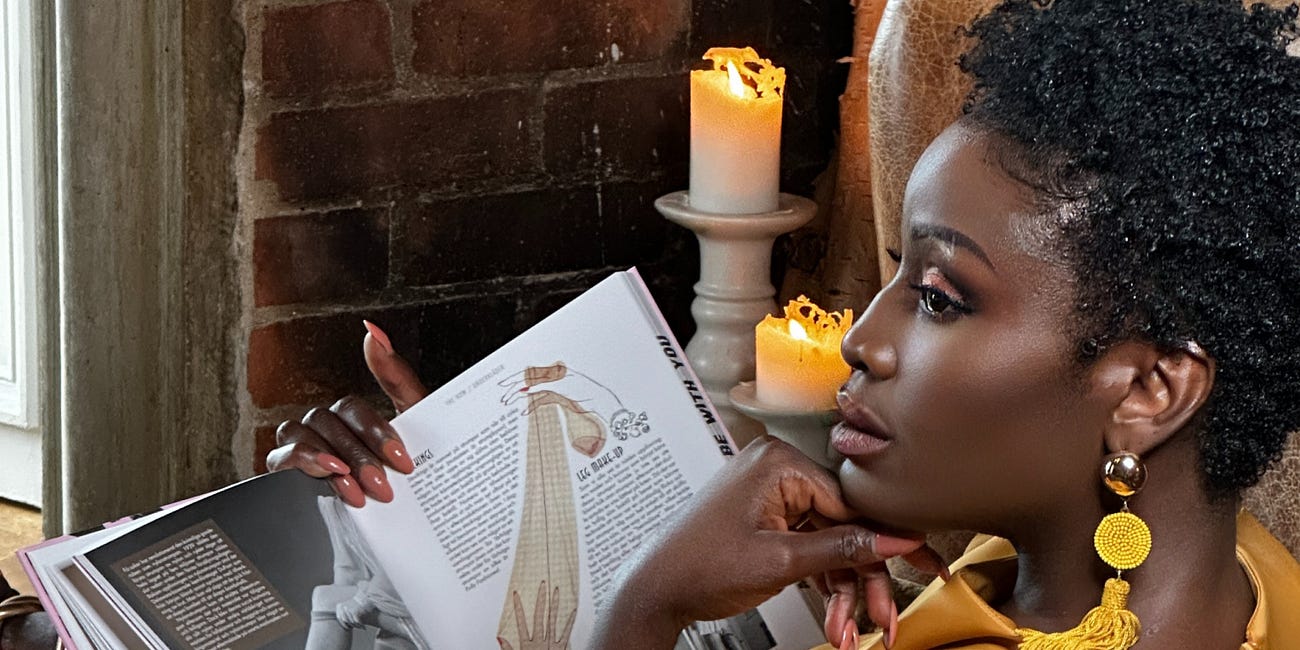
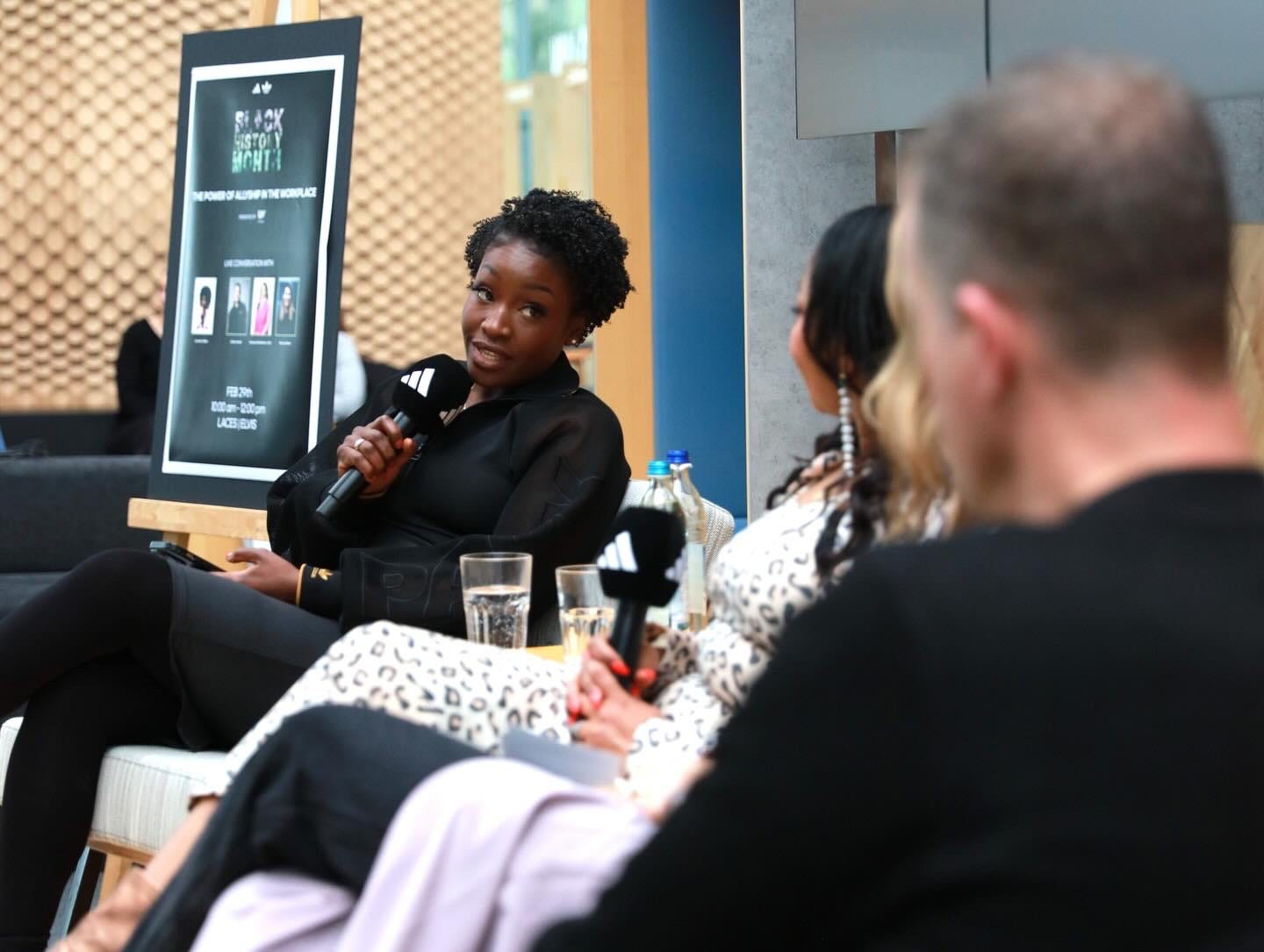

What you’ve accomplished here isn’t merely an exposing, it’s a scalpel slicing through the obscurity and smoke of a major grift masquerading as neurodivergent care. Thank you for this, your work is absolutely crucial in harm reduction and ensuring that vulnerable people don't get exploited by organisations that prey on the fact that there are often limited affordable resources.
I am speechless. This is so important! Thank you for this.